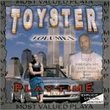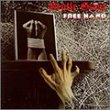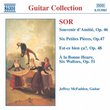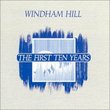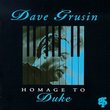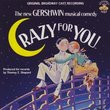| All Artists: Johann Sebastian Bach, Helmut Walcha Title: Bach: Great Organ Works Members Wishing: 0 Total Copies: 0 Label: Deutsche Grammophon Release Date: 7/15/1997 Genre: Classical Styles: Forms & Genres, Variations, Historical Periods, Baroque (c.1600-1750), Modern, 20th, & 21st Century, Instruments, Keyboard, Symphonies Number of Discs: 2 SwapaCD Credits: 2 UPC: 028945306421 |
Search - Johann Sebastian Bach, Helmut Walcha :: Bach: Great Organ Works
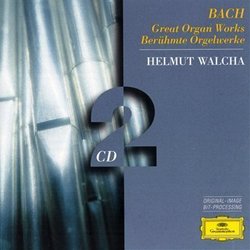 | Johann Sebastian Bach, Helmut Walcha Bach: Great Organ Works Genre: Classical
|
Larger Image |
CD DetailsSimilar CDs
Similarly Requested CDs
|
CD ReviewsThe Art of Counterpoint R. SA NOGUEIRA SARAIVA | LISBOA Portugal, Europe | 02/06/2002 (5 out of 5 stars) "The Bach of Helmut Walcha is different from all the others. He pays great attention to the expression of each voice, and the structure of the great organ works is also totally evident in his playing. The fugues, particularly, are unique. Where other organists ruch to bring some animation to what may seem an endless sucession of entries of theme and countersubjects, Walcha just grabs the listener's attention to focus on the phantastic richness of expression and intelligence of the great fugues. With Walcha, the whole takes precedence over the parts, so there are not rubatos over a short phrase. Instead, there is a perfect sense of structure, which is rendered possible by the greatest of controls on tempo, flexible over great stretches of music.The chorals are similarly approached. One might prefer a more sentimental approach - particularly in the shorter pieces -, but if you listen carefully all the agogics he uses make the music perfectly clear, and extremely beautifull. This is an archetypical vision of Bach. You might prefer a softer one, but you will not get a better one. In a sense, Walcha reminds me of a pun an organist friend of mine often used to tell: In heaven, when God is present, the angels play Bach; when they're alone, the play Mozart. This is the kind of Bach God likes to listen to." If you like Bach's organ music, you MUST have it! R. SA NOGUEIRA SARAIVA | 08/31/1999 (5 out of 5 stars) "This is a collection of fine performances by a superb Bach interpreter. The playing is always exhilarating without the kind of over-performance and cheap fireworks sometimes heard, particularly of the opening Toccata and Fugue in D Minor. I've heard many recordings of this piece, none of which match this one's perfect combination of virtuosity with restraint. But the Toccata and Fugue in F Major is the best on the album, in my opinion, building to an incredible crescendo from a deceptively simple, almost mechanical, beginning. Other highlights are the Passacaglia and Fugue in C Minor and the magnificent Prelude and Fugue in E-flat Major (St. Anne's). The first couple of minutes of the latter fugue are perhaps the most majestic in all of Bach, although this performance doesn't quite match that performed on the St. Laurenskerk "great" organ, also available on CD ("Organ Works"). If you like Bach's organ music, you can't do without Helmut Walcha, and this seems to be the largest collection of his recordings available." Great STEREO recording Paul S. | Oakland, California | 07/08/2007 (5 out of 5 stars) "A previous review describes this set as "recorded in 1947 in mono." Just in case both Deutsche Grammophon and my ears were deceiving me, I listened to it with headphones to ascertain that indeed, it is recorded in stereo--even the oldest track, which is dated 1956 by the CD notes.
It's recorded in pretty good stereo, at that--really outstanding considering its age (mostly '60s and '70s). Not that it's on a par with audiophile CDs of recent years, but it sounds clean and clear. There are somewhat strong treble overtones from the Alkmaar organ (not so much from the Strasbourg organ that fills CD #2), but not to the point of annoying me. You definitely catch the nuances of the organs' differences, as well as the shuffling sounds of the action (in quiet passages). Walcha's playing contributes as much to the clarity of these disks as the engineers did. It's as lucid as you can ask for without getting mechanical about it. Maybe when I've heard these disks many times I will develop the sort of mystical attachment to them that others have expressed. For now, though, they represent excellent straightforward Bach, nothing more, nothing less. Walcha is not as flamboyant as Biggs or Fox; pedal notes don't shake the house and the melody line is not always at maximum perkiness. But there's nothing boring about this set. On the contrary, there is not only an adequate amount of fire, but also depth and great cohesion in Walcha's playing, never empty note-spinning or passages that seem out of place with the whole. It seems obvious as I listen that not one, but two powerful musical minds are at work." |

 Track Listings (11) - Disc #1
Track Listings (11) - Disc #1